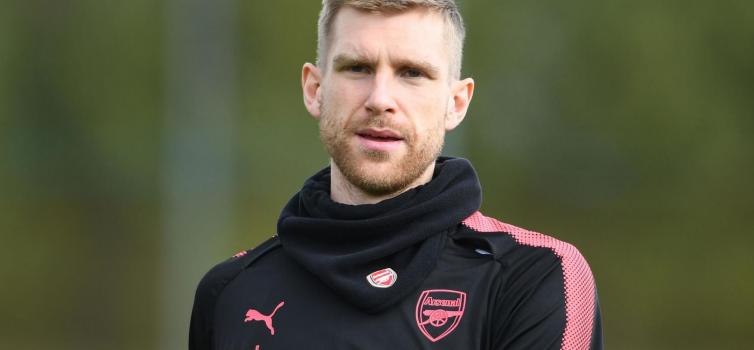Mertesacker: How I'll change Academy players' mindsets

Mertesacker has just taken over as Arsenal Academy Manager
Written by Simon Austin — May 20, 2018
INCOMING Arsenal Academy boss Per Mertesacker says changing players’ mindsets will be a key objective for him in his new job.
The German retired from playing at the end of the season and has taken up a new role as Arsenal Academy Manager, with Lee Herron alongside him as Operations Manager.
Mertesacker said footballers “are used to working only three hours a day” and “are on their mobile phones for half that.”
In an exclusive extract of his new book, Weltmeister ohne Talent, published in the Guardian, Mereacker said: “I will do everything I can to challenge the young players’ mindsets. I want to challenge them so that they are ready to take on new ideas and protect them from being injured, when it comes to their body and soul.
“I want to convince them they have to do something to get to the top of the world and I want to be an example for them. For me there wasn’t really a way up but somehow I made it there anyway, because I did everything I possibly could to give me the best chances to succeed. Talent is what you make of your situation.
“Footballers are used to working only three hours a day. And out of the three hours they are at the training ground they are on their mobiles for half of that.
“We have all the money in the world but do not realise how important the body is. A player on average has a seven year professional career, 10-15 if everything goes right. You have to do everything possible to be at your maximum.”
The German said he had spent 10% of his net salary on personal therapists during his career and singled out the work he had done with “neuro athletic coach” Lars Lienhard as particularly useful. He first employed the former athlete's services in February 2012.
“Working with him was a huge success,” Mertesacker said. “We always assume that we can run and see properly because nothing hurts. But that is a mistake. Lars showed me that our eyes are a big factor in everything, above all when it comes to our timing.
“On my right side my timing was super but I had the feeling my left eye was not really up for it. Why was that? It all meant that in 50% of the times the ball came towards me my brain said, 'Hey, I can’t really see that ball so I’m not going to jump for it'.
“As my left eye was not really looking at the ball I was always twisting my neck to use my dominant right eye. During the exercises with Lars one could see quite clearly that my eyes were moving differently when an object was approaching me. My left eye always remained in the middle rather than focusing on the object.
“He showed me how to make my left eye stronger. I had a patch on my right eye, forcing my left to focus on the objects. After a few weeks I could really notice the difference in games. If there was a high ball from the left I had a much better feeling for where it would end up.
“Football doesn’t really deal with those things, despite the fact they can be decisive.
"Players would rather lift weights, stand on their own with their dumbbells – but how does that help me on the pitch?"




-1.png)





